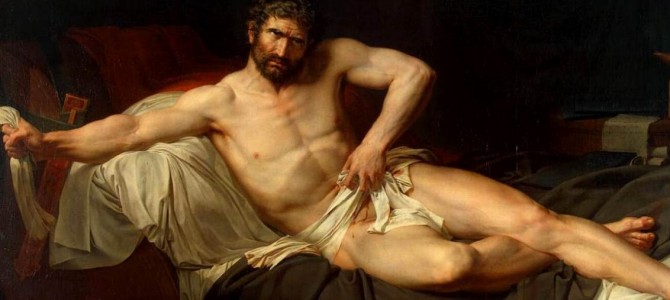The final stages of the Roman Republic saw the clash of wills among giants of the ancient world. Perhaps the most important of these clashes was between Cato the Younger, a respected statesman and member of the Optimates Senate faction, and Julius Caesar, the bold general of insatiable ambition. While Caesar’s story is widely known—crossing the Rubicon with his legions and eventually being declared “dictator” for life—the story of Cato, unfortunately, does not enjoy comparable notoriety.
The Roman George Washington
Cato was renowned for his uncompromisingly simple and austere way of life. He kept a watchful eye on his diet, consuming only what was necessary to be of healthy constitution, ever wary of drifting into gluttony. Cato maintained a strenuous exercise regimen and spent little money on material pleasures.
This incredible discipline carried over into Cato’s political career. In his years holding a string of public offices, including his most notable position as a senator, Cato gained distinction for his scruples in handling public spending and taxes, and limiting the authority of Rome’s officials. Stories of Cato’s legendary devotion to republicanism and Roman liberty stretch back even to his youth. Perhaps the most vivid tale is of a teenage Cato, during Sulla’s dictatorship, bluntly demanding of his teacher to “Give me a sword, that I might free my country from slavery.”
After Cato’s stint overseeing Roman affairs in Cyprus, the Senate showered him with official praises and offers of greater power. Cato, austere and consistent, declined all of these offers, which he believed would have been illegal and improper for him to accept. How many politicians in America today would hold to such convictions if showered with offers of praise, recognition, and power?
Caesar: A Dictator in Every Sense
Unfortunately, too many follow the path of Caesar, reflexively accepting and reveling in greater power and prestige, even if such glories are unconstitutional. How many American politicians, whether in office or retired, would decline a taxpayer-funded dinner or social function in their honor? How many would decline a taxpayer-funded medal or award presented to them by Congress or the president? How many would decline the great power to impose new legislation by whim?
This is no exaggeration. Presidents have used executive orders and signing statements as if they were legal decrees issued by the absolute monarchs of old. Executive disregard for the legislature was Caesar’s tried-and-true tactic. Much as our presidents have done with increasing frequency in recent decades, Caesar would sidestep recommendations of the Senate and councils to push his agenda forward by executive decree. This route of governing should sound quite familiar.
Caesar’s disdain for the rule of law brought permanent dictatorship to Rome, setting the stage for the Republic to dissolve and be replaced with an unaccountable empire. Cato fought to save the Roman Republic and the principle that no citizen of a republic was above the law. With the advent of the Roman Empire, these noble ideas were swept away and emperors were elevated above the citizens.
Vote for Virtue
Whether it has been the god-regent pharaohs of ancient Egypt, the absolute monarchs of Europe, the Aztec emperors, the Russian czars, the fascists of the 1930s and ’40s, Cold War communist dictators, the Iranian Ayatollahs, or the “Dear Leader” and his North Korean cult of personality, those who wish to wantonly lord power over others have been a staple of human history.
Cato stood in stark contrast to this cruel, base, and animal impulse. He embodied the idea that societies can raise themselves up, to foster a greater individual dignity and secure a greater freedom, by restricting the concentration of executive power and upholding the rule of law.
The American republic’s commitment to the rule of law and holding public officials to the same standard will be tested in the upcoming 2016 elections and beyond. Our republic should spurn personalities like Caesar’s in favor of the incorruptibility and restraint of Cato.









